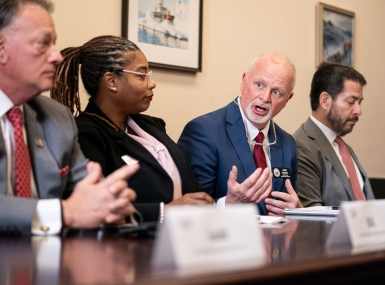Texas winter storm: ‘Never seen anything like it’
Author
Upcoming Events
Related News

Key Takeaways
February has brought nasty winter weather to counties across the country with many of the impacted areas unaccustomed to the snow and ice.
Counties in Texas have experienced ongoing winter weather in full force starting with an ice storm the second week of February that led to a 133-vehicle pile-up on a Tarrant County interstate because of icy roads.
Following the ice storm, a record-breaking snowstorm hit central Texas with much of the state later hit by an additional ice storm.
The National Weather Service declared a winter storm warning for all 254 Texas counties. Texas Gov. Greg Abbott (R) issued a statewide disaster declaration following the winter weather that left power outages, burst pipes, dangerous road conditions and Texans struggling to find ways to keep warm.
Texas Association of Counties Executive Director Susan Redford said she’s never seen comparable winter weather in Texas that has lasted for more than a week.
“It’s a very unique event for us,” she said.
The biggest challenges facing counties during the storms and the aftermath, she noted, are mobility issues, followed by power outages, loss of water and loss of internet service.
“Roads, especially in central and south Texas, are simply not drivable,” she said. “This part of Texas is really not prepared because we don’t experience winter weather very often.”
With millions experiencing power losses, Redford said counties are calling for a reform of the state’s power grid system. Texas is one of the only states with its own electrical grid.
“It was wildly underprepared for an event such as this,” Redford said.
The power grid was at a “level 3” state of emergency, which was unsustainable and resulted in rolling power outages for providers on the grid, Redford said. She added that many providers’ old infrastructure and failing transformers have not helped the situation.
It is the number one priority of counties, she said, to keep residents safe by opening emergency operation centers and providing basic needs such as food, shelter and warm water.
In Montgomery County, Texas, Office of Homeland Security and Emergency Management Public Information Officer Meghan Arthur said the majority of the county was without power for a period of three days.
Arthur lost power in her own home for over 17 hours after the storm rolled in on Feb. 14.
County residents also experienced water loss after infrastructure issues impacted water plants, leaving county buildings without water.
“We’ve had quite an uptick on our fire calls to 911 and we’ve had a lot of carbon monoxide poisoning,” she said.
Montgomery County requested resources from the state to help with the lack of water and opened warming stations as winter weather continued into the third week of February.
“We’re concerned how that’s going to continue to affect infrastructure, if it’s going to cause more problems,” she said.
In Harris County, Judge Lina Hidalgo, who went without power and water in her home for at least four nights, signed a disaster declaration for the county where over 1 million homes and businesses experienced power outages.
Hidalgo told NBC’s Today Show Feb. 17 the vast majority of outages in the county were caused by forced state mandates of the state power grid.
“Things will likely get worse before they get better,” she said during a press conference, adding that the power outages were likely to continue as weather improved.
The Harris County Public Health Department building also lost power causing a backup generator to fail. The building was storing over 8,000 Moderna vaccines.
After distributing more than 5,000 of the vaccines to hospitals, the county jail and Rice University, Hidalgo said they received guidance from Moderna that they could re-refrigerate the remainder of the shots which are being stored for later use.
Throughout the winter weather, she warned residents to stay off the roads and store enough water to last for a few days. “I understand the frustration,” she said. “It’s an awful situation. We’re asking folks to persevere.”

Attachments
Related News

Padilla calls for common sense bipartisanship to tackle disasters, mental health crisis
Sen. Alex Padilla (D-Calif.) started learning about wildfire damage firsthand as a Senate staffer in the 1990s, which gave him experience and perspective seeing how counties responded after disasters.

U.S. Senate reintroduces bipartisan disaster mitigation bill to support homeowners
On January 30, a bipartisan group of senators reintroduced the Disaster Mitigation and Tax Parity Act of 2025, a bill aimed at eliminating federal taxation of state-provided residential mitigation grants. NACo previously supported this legislation and continues to advocate for its passage to support county resilience efforts.

